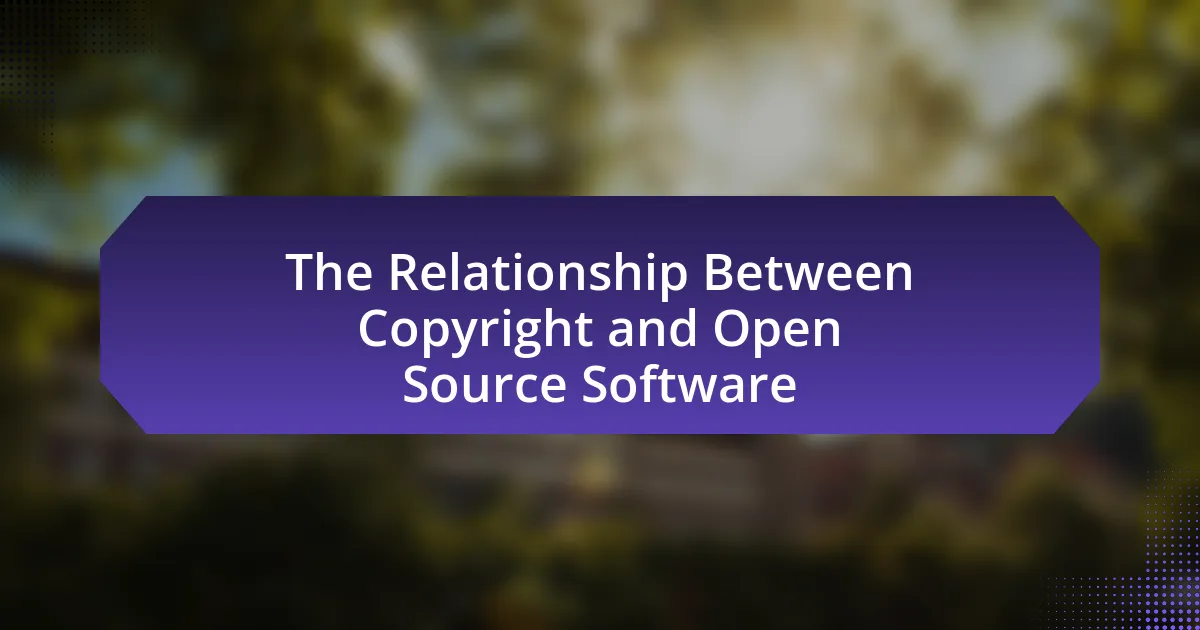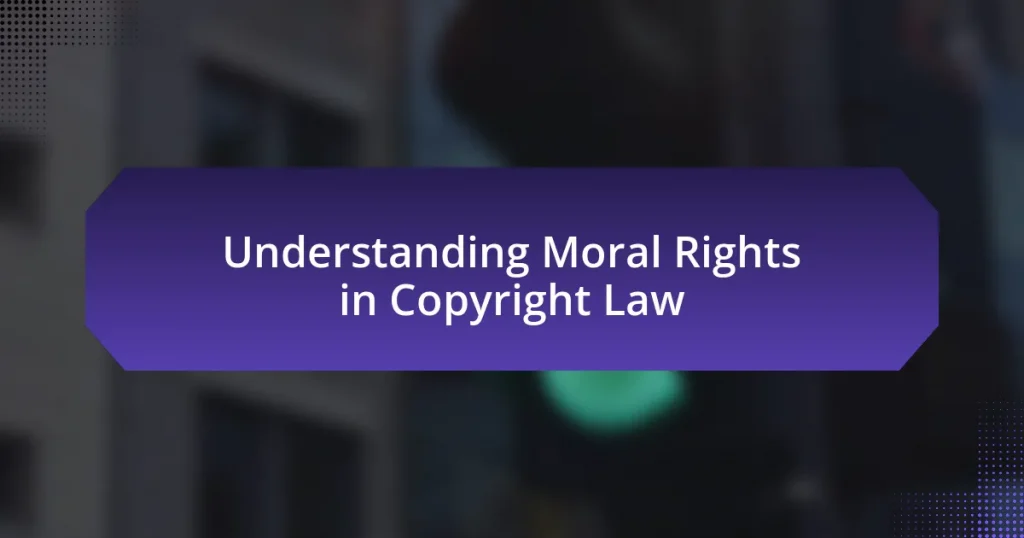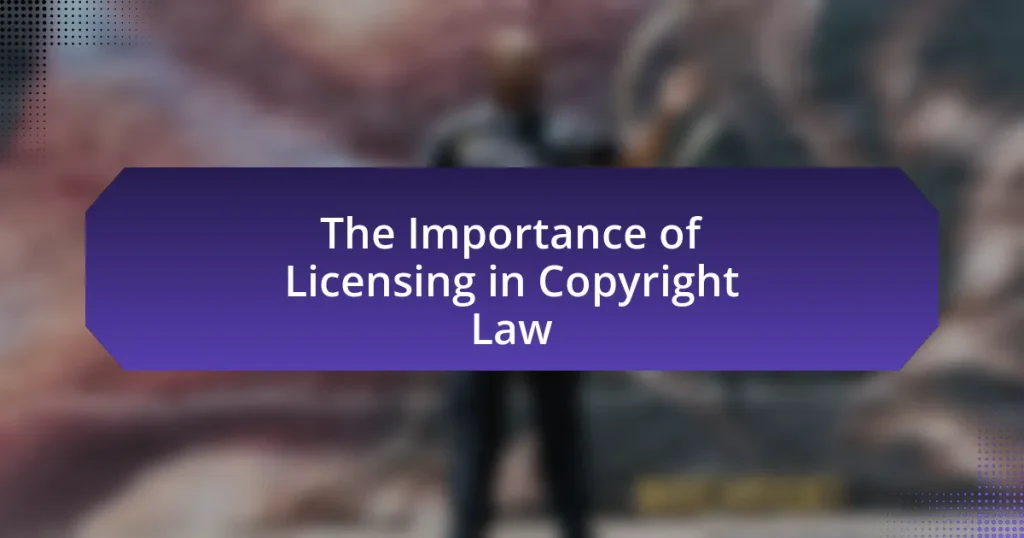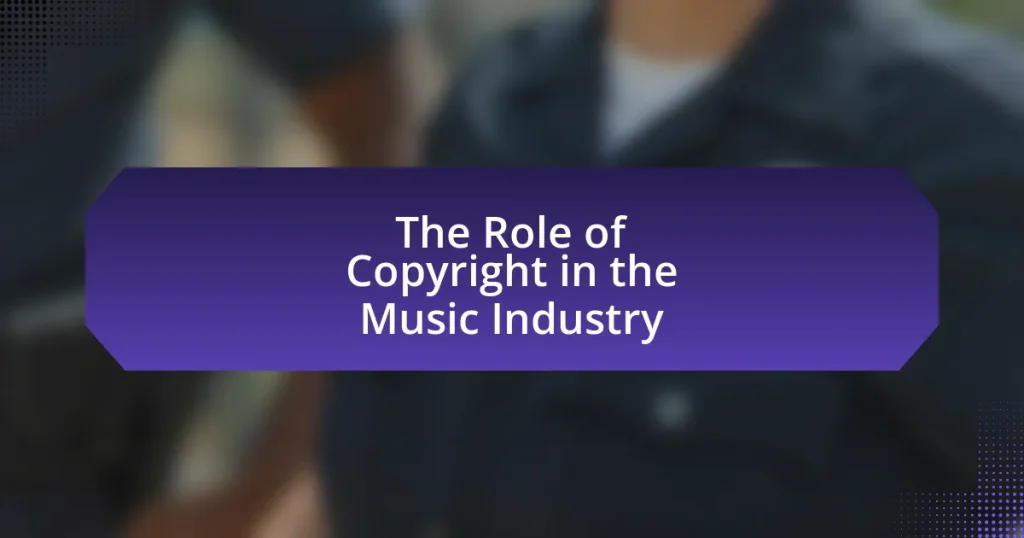The article examines the relationship between copyright and open source software, highlighting how copyright law provides the legal framework for the use and distribution of open source software. It discusses the application of copyright law to open source licenses, such as the GNU General Public License (GPL) and the MIT License, which allow for modification and sharing while protecting the rights of original creators. Key principles of copyright, variations across jurisdictions, and the importance of understanding copyright for developers are explored, along with the implications of different types of open source licenses. The article also addresses the risks of non-compliance with copyright laws and offers best practices for developers to ensure adherence to licensing terms.
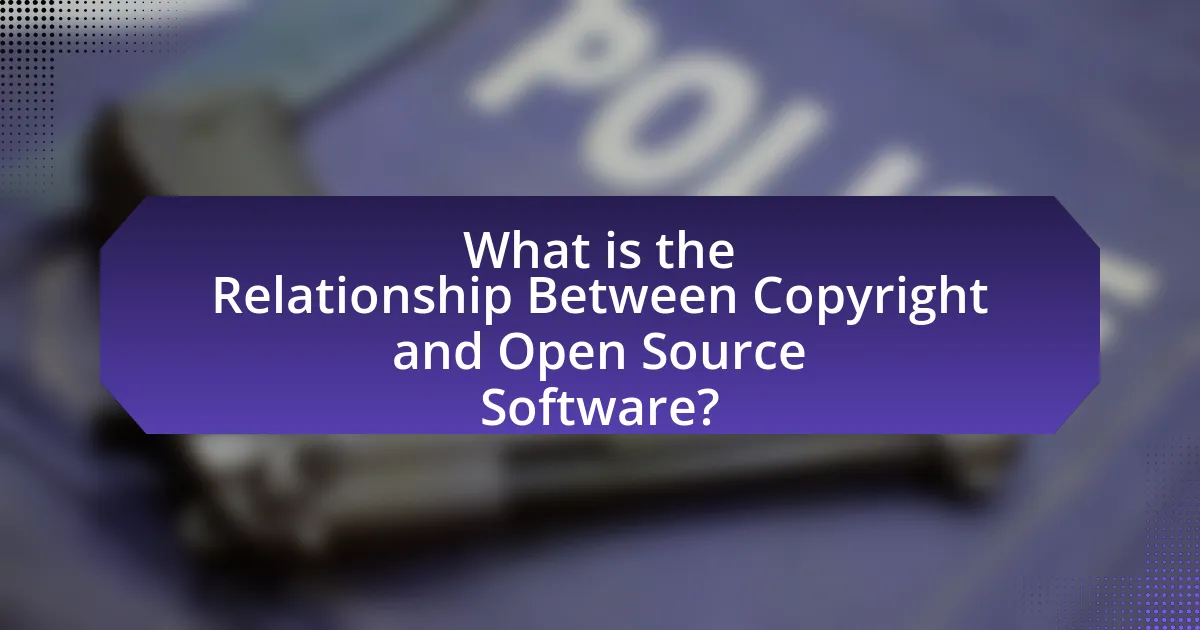
What is the Relationship Between Copyright and Open Source Software?
Copyright provides the legal framework that governs the use and distribution of open source software. Open source software is typically released under licenses that allow users to modify, distribute, and use the software freely, but these licenses are still rooted in copyright law, which protects the original creator’s rights. For example, the GNU General Public License (GPL) ensures that any derivative works also remain open source, thus enforcing the principles of sharing and collaboration while adhering to copyright regulations. This relationship highlights how copyright can both enable and restrict the use of software, depending on the terms set forth in the open source licenses.
How does copyright law apply to open source software?
Copyright law applies to open source software by granting the original authors exclusive rights to their code while allowing them to license it under terms that promote sharing and modification. Open source licenses, such as the GNU General Public License (GPL) or the MIT License, are legally binding agreements that specify how others can use, modify, and distribute the software. These licenses ensure that the software remains open and accessible, while still protecting the authors’ rights under copyright law. For instance, the GPL requires that any derivative works also be distributed under the same license, thereby maintaining the open source nature of the software.
What are the key principles of copyright in relation to software?
The key principles of copyright in relation to software include the protection of original works, the exclusive rights granted to creators, and the limitations on those rights. Copyright law protects software as a literary work, meaning that the code and its expression are safeguarded from unauthorized reproduction, distribution, and modification. Creators hold exclusive rights to their software, allowing them to control how it is used and shared, which is fundamental for commercial viability. However, copyright also includes limitations such as fair use, which permits certain uses without permission, and the concept of open source, where creators can choose to license their software for public use while retaining some rights. These principles ensure a balance between protecting creators’ interests and promoting innovation and access within the software industry.
How do copyright laws differ across jurisdictions for open source software?
Copyright laws for open source software vary significantly across jurisdictions, primarily due to differences in national legal frameworks and interpretations of copyright principles. For instance, in the United States, the Copyright Act allows for broad protections and the use of licenses like the GNU General Public License (GPL), which mandates that derivative works also remain open source. In contrast, European jurisdictions may emphasize moral rights more heavily, affecting how open source licenses are enforced and interpreted. Additionally, some countries, such as India, have specific provisions that recognize software as a literary work, which can influence the application of copyright laws. These variations can lead to differing levels of protection and obligations for developers and users of open source software, impacting global collaboration and distribution.
Why is understanding copyright important for open source developers?
Understanding copyright is crucial for open source developers because it governs the legal framework within which they operate. Copyright laws dictate how software can be used, modified, and distributed, directly impacting the rights of developers and users. For instance, the GNU General Public License (GPL) requires that any derivative work must also be open source, ensuring that the original creator’s rights are protected while promoting collaboration. Without a solid grasp of copyright, developers risk infringing on others’ intellectual property, which can lead to legal disputes and undermine the open source ethos of sharing and innovation.
What risks do developers face if they ignore copyright laws?
Developers face significant legal and financial risks if they ignore copyright laws. These risks include potential lawsuits from copyright holders, which can result in costly legal fees and damages. For instance, a developer found infringing on copyright may be liable for statutory damages ranging from $750 to $30,000 per work, and in cases of willful infringement, damages can escalate to $150,000 per work. Additionally, ignoring copyright laws can lead to the loss of reputation and trust within the software community, as well as the possibility of being barred from using certain technologies or platforms. These consequences underscore the importance of adhering to copyright regulations in software development.
How can developers ensure compliance with copyright when using open source licenses?
Developers can ensure compliance with copyright when using open source licenses by thoroughly understanding the specific terms and conditions of the licenses associated with the software they intend to use. Each open source license, such as the GNU General Public License (GPL) or the MIT License, has distinct requirements regarding usage, modification, and distribution. For instance, the GPL requires that any derivative work also be distributed under the same license, ensuring that the original copyright holder’s rights are respected. By carefully reviewing and adhering to these stipulations, developers can avoid copyright infringement and maintain legal compliance.
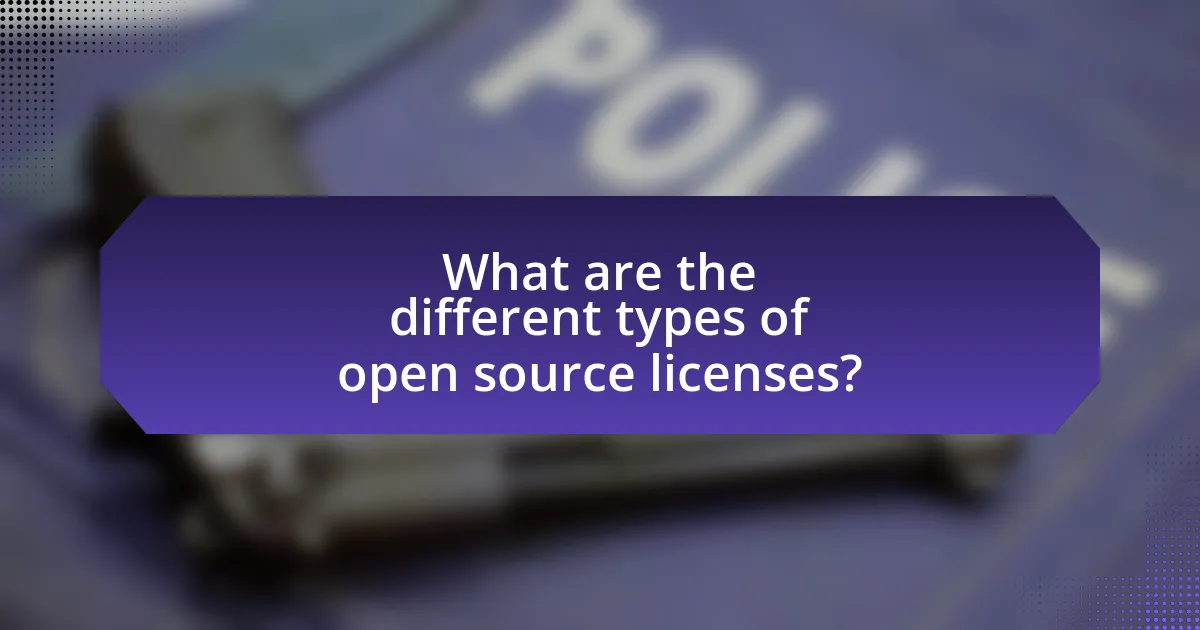
What are the different types of open source licenses?
The different types of open source licenses include permissive licenses, copyleft licenses, and public domain licenses. Permissive licenses, such as the MIT License and the Apache License, allow users to modify and distribute the software with minimal restrictions. Copyleft licenses, like the GNU General Public License (GPL), require that any derivative works also be distributed under the same license, ensuring that the software remains open source. Public domain licenses, such as the Unlicense, allow software to be freely used, modified, and distributed without any restrictions. These classifications are essential for understanding how open source software interacts with copyright law, as they dictate the terms under which software can be shared and modified.
How do permissive licenses differ from copyleft licenses?
Permissive licenses allow software to be freely used, modified, and distributed with minimal restrictions, while copyleft licenses require that any derivative works also be distributed under the same license terms. For example, permissive licenses like the MIT License permit proprietary use and do not impose obligations on redistribution, whereas copyleft licenses, such as the GNU General Public License (GPL), mandate that any modified versions must also be open source and share the same licensing conditions. This fundamental difference shapes how developers can utilize and share software, influencing the broader open source ecosystem.
What are the implications of using permissive licenses for copyright?
Using permissive licenses for copyright allows creators to grant broad rights to users, facilitating the sharing and modification of their works. This approach encourages innovation and collaboration, as it enables developers to build upon existing software without the constraints of more restrictive licenses. For instance, permissive licenses like the MIT License and the Apache License have been instrumental in the growth of open source software, allowing companies and individuals to use, modify, and distribute software freely. The implications also include potential commercialization opportunities, as permissive licenses often permit proprietary derivatives, which can lead to financial benefits for developers. Additionally, the simplicity and clarity of permissive licenses reduce legal barriers, making it easier for projects to gain traction and attract contributors.
How do copyleft licenses protect the rights of authors and users?
Copyleft licenses protect the rights of authors and users by allowing authors to retain their copyright while permitting users to freely use, modify, and distribute their work under the same license terms. This framework ensures that any derivative works remain open and accessible, thereby promoting collaboration and innovation. For instance, the GNU General Public License (GPL) mandates that any software derived from GPL-licensed code must also be distributed under the GPL, ensuring that users can always access the source code and maintain their rights to modify it. This reciprocal nature of copyleft licenses fosters a community-driven approach to software development, where both authors and users benefit from shared knowledge and resources.
What role do licenses play in the relationship between copyright and open source software?
Licenses serve as the legal framework that governs the use, modification, and distribution of open source software, directly linking copyright law to open source principles. Copyright grants creators exclusive rights over their works, while open source licenses explicitly allow users to exercise certain rights, such as modifying and sharing the software, under specified conditions. For example, the GNU General Public License (GPL) ensures that derivative works remain open source, reinforcing the original creator’s copyright while promoting collaborative development. This relationship is crucial because it balances the protection of intellectual property with the open sharing of software, fostering innovation and community engagement in software development.
How do licenses define the terms of use for open source software?
Licenses define the terms of use for open source software by specifying the permissions, conditions, and limitations under which the software can be used, modified, and distributed. Each open source license, such as the GNU General Public License (GPL) or the MIT License, outlines the rights granted to users, including the ability to access the source code, make modifications, and share the software with others. For example, the GPL requires that any derivative work also be distributed under the same license, ensuring that the software remains open source. This legal framework is essential for protecting the rights of both the original authors and the users, as it establishes clear guidelines that govern the use and distribution of the software, thereby fostering collaboration and innovation within the open source community.
What are the consequences of violating open source licenses?
Violating open source licenses can lead to legal consequences, including lawsuits and financial penalties. Open source licenses are legally binding agreements that dictate how software can be used, modified, and distributed. When these terms are not followed, the original authors or copyright holders have the right to enforce their licenses through legal action. For instance, in 2018, a notable case involved the Software Freedom Conservancy suing a company for failing to comply with the GPL license, resulting in a settlement that highlighted the enforceability of such licenses. Additionally, violators may face reputational damage and loss of access to the software community, as adherence to licensing is crucial for collaboration and trust within open source ecosystems.
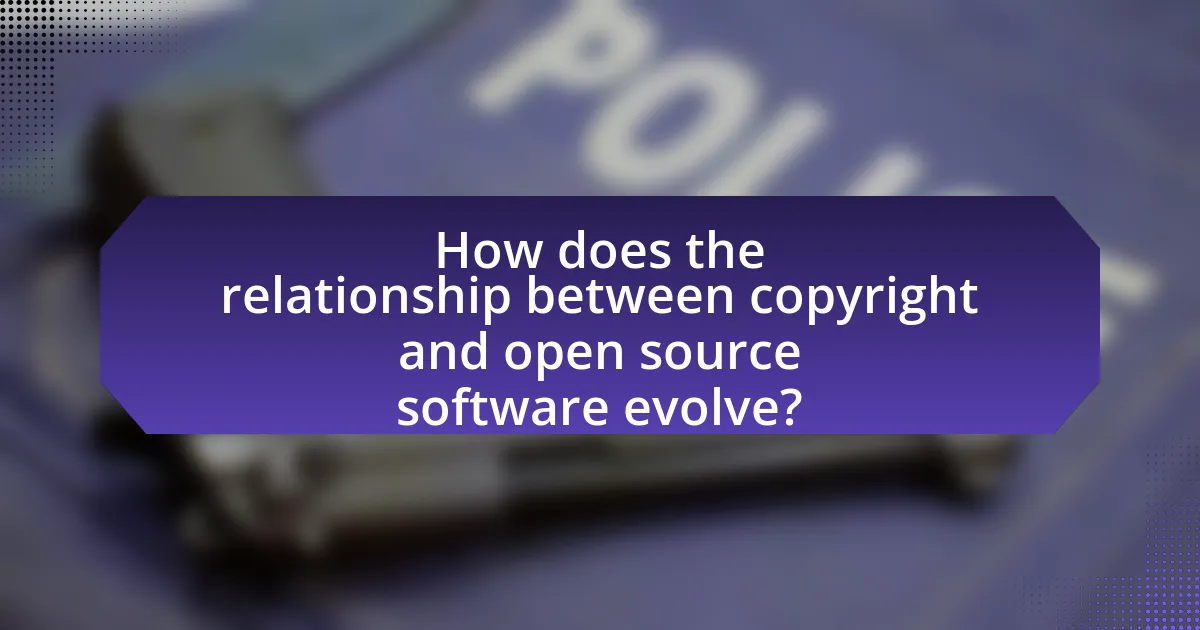
How does the relationship between copyright and open source software evolve?
The relationship between copyright and open source software evolves through the adaptation of copyright laws to accommodate the principles of open source licensing. Open source software relies on copyright to protect the source code while allowing users to modify and distribute it under specific conditions. For instance, licenses like the GNU General Public License (GPL) and the MIT License explicitly define how software can be used, modified, and shared, ensuring that the original authors retain certain rights while promoting collaborative development. This evolution reflects a growing recognition of the importance of open source in fostering innovation and collaboration in the software industry, as evidenced by the increasing adoption of open source projects by major corporations and governments.
What recent trends are influencing copyright and open source software?
Recent trends influencing copyright and open source software include the rise of collaborative development models and increased scrutiny of software licensing. Collaborative development models, such as those seen in platforms like GitHub, promote shared contributions and transparency, which challenge traditional copyright norms by emphasizing community ownership over individual rights. Additionally, legal cases, such as the Oracle vs. Google case, highlight the complexities of copyright in software, particularly regarding fair use and the use of APIs, thereby shaping how open source licenses are interpreted and enforced. These trends reflect a shift towards more flexible and adaptive approaches to copyright in the context of rapidly evolving software ecosystems.
How are legal cases shaping the future of open source licensing?
Legal cases are significantly influencing the future of open source licensing by establishing precedents that clarify the legal boundaries and obligations associated with open source software. For instance, the Oracle v. Google case highlighted the complexities of copyright in software, particularly regarding the use of APIs, which has implications for how open source licenses are interpreted and enforced. Additionally, cases like the one involving the Free Software Foundation and the enforcement of the GNU General Public License (GPL) demonstrate the legal system’s role in upholding the terms of open source licenses, thereby reinforcing the importance of compliance and the potential consequences of violations. These legal developments shape the landscape of open source licensing by providing clearer guidelines for developers and organizations, ultimately influencing how open source software is created, shared, and utilized in the future.
What impact do technological advancements have on copyright in open source software?
Technological advancements significantly impact copyright in open source software by facilitating easier distribution and modification of code while raising concerns about compliance and enforcement. The proliferation of cloud computing, version control systems, and automated tools allows developers to share and collaborate on open source projects more efficiently, which can lead to increased innovation. However, these advancements also complicate the enforcement of copyright laws, as the rapid pace of technology can outstrip legal frameworks, making it challenging to address issues like licensing violations or unauthorized use. For instance, the rise of platforms like GitHub has enabled widespread access to open source code, but it also necessitates a clearer understanding of licensing terms to ensure proper attribution and compliance with copyright regulations.
What best practices should developers follow regarding copyright and open source software?
Developers should adhere to several best practices regarding copyright and open source software to ensure compliance and ethical use. First, they must understand and respect the licensing terms of open source software, as each license outlines specific permissions and restrictions. For instance, the GNU General Public License (GPL) requires that any derivative work also be open source, while the MIT License allows for more flexibility in usage.
Additionally, developers should provide proper attribution to original authors when using or modifying open source code, as this acknowledges the contributions of others and complies with many open source licenses. Furthermore, maintaining clear documentation of the software components used, including their licenses, helps in tracking compliance and facilitates future audits.
Lastly, developers should stay informed about changes in copyright law and open source licensing to adapt their practices accordingly, as legal interpretations can evolve. By following these practices, developers can contribute positively to the open source community while protecting their own work and ensuring legal compliance.
How can developers effectively manage copyright compliance in their projects?
Developers can effectively manage copyright compliance in their projects by implementing a systematic approach that includes understanding copyright laws, utilizing open source licenses correctly, and maintaining thorough documentation. Understanding copyright laws ensures that developers are aware of their rights and obligations regarding the use of third-party code. Utilizing open source licenses correctly, such as the GNU General Public License or MIT License, allows developers to leverage existing code while adhering to the terms set forth by the original authors. Maintaining thorough documentation of all code sources, licenses, and modifications helps in tracking compliance and provides a clear reference in case of disputes. This structured approach minimizes the risk of copyright infringement and fosters a culture of respect for intellectual property within the development community.
What resources are available for understanding copyright and open source software?
Resources for understanding copyright and open source software include the Open Source Initiative (OSI), which provides guidelines and licenses for open source projects, and the Creative Commons organization, which offers licenses that facilitate sharing and use of creative works. Additionally, the Electronic Frontier Foundation (EFF) offers extensive resources on copyright law and its implications for software. Academic texts such as “Open Source Licensing: Software Freedom and Intellectual Property Law” by Andrew M. St. Laurent provide in-depth analysis of the legal frameworks surrounding open source software. These resources collectively offer comprehensive insights into the intersection of copyright and open source software.
